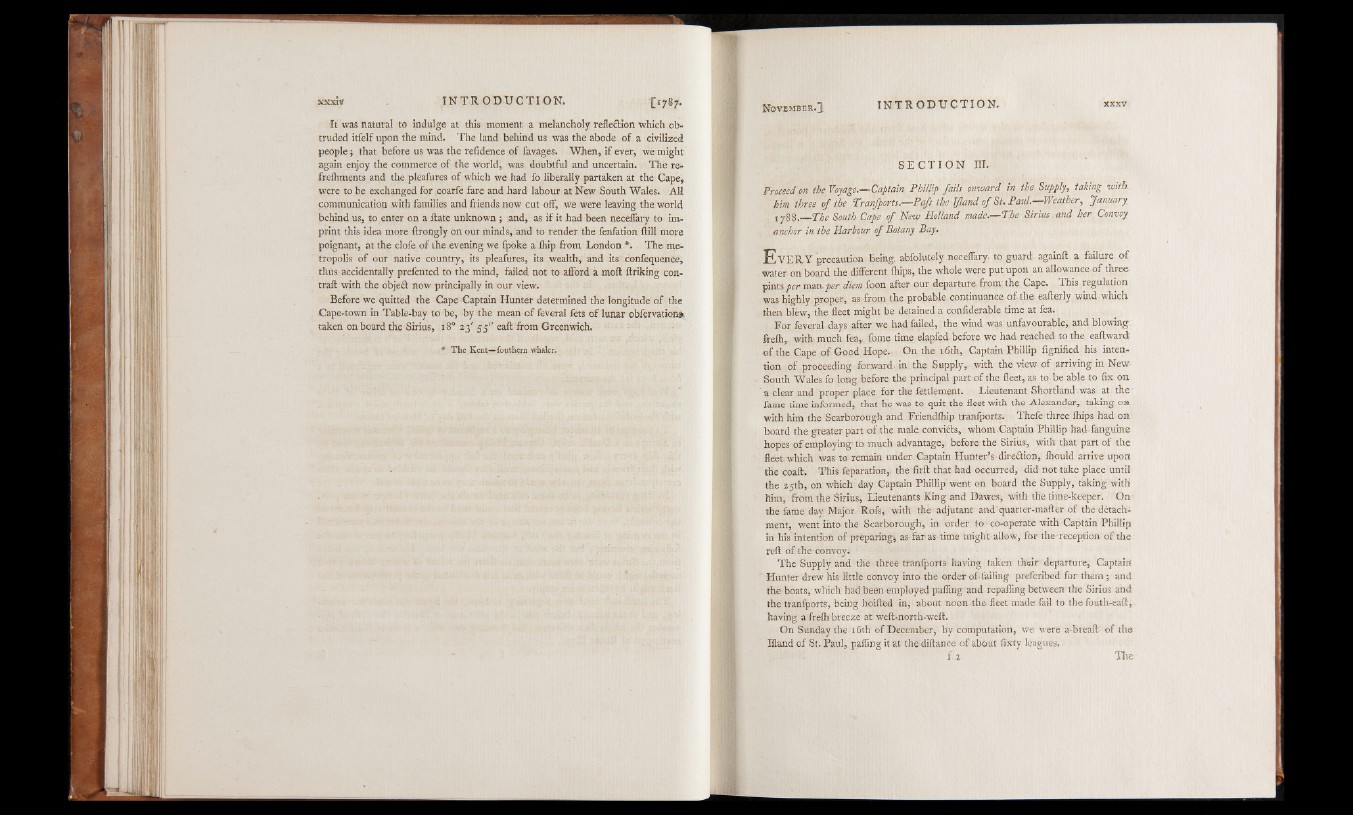
It was natural to indulge at this moment a melancholy reflection which obtruded
itfelf upon the mind. The land behind us was the abode of a civilized
people; that before us was the refidence of favages. When, if ever, we might
again enjoy the commerce o f the world, was doubtful and uncertain. The re-
frefhments and the pleafures of which we had fo liberally partaken at the Cape,
were to be exchanged for coarfe fare and hard labour at New South Wales. A ll
communication with families and friends now cut oil', we were leaving the world
behind us, to enter on a Hate unknown ; .and, as if it had been neceffary to imprint
this idea more ftrongly on our minds, and to render the fenfation ftill more
poignant, at the clofe o f the evening we fpoke a fhip from London *. The metropolis
of our native country, its pleafures, its wealth, and its confequence,
thus accidentally prefented to the mind, failed not to afford a moft ftriking con-
traft with the object now principally in our view.
Before we quitted the Cape Captain Hunter determined the longitude o f the
Cape-town in Table-bay to be, by the mean o f feveral fets of lunar obfervationa
taken onboard the Sirius, 180 23' 55" eaft from Greenwich.
* The .Kent—fouthern whaler.
S E C T I O N m
Proceed' on the Voyage.— Captain Phillip fa ils onward in the Supply, taking with
him three o f the Tranfports.— Pafs the Ifland of St. Paul.— Weather, January,
1788._The South Cape i f New Holland made.— The Sirius- and her Convoy
anchor in the Harbour, of Botany Bay>
E v e r y precaution being, abfolutely neceffary. to guard againft a failure of
water- on board the different fhips, the whole were put upon an allowance-of three-
pints per man .per diem foon after our departure- from; the Cape. This regulation
was highly proper., as-from the probable continuance-of. the eafterly wind which
then, blew, the fleet might be detained a confiderable time at fea.
For feveral days after we had failed, the wind was unfavourable, and blowing:
frefh, with-much fea, fome time elapfed. before, we had reached to the eaftward'
of the Cape of Good Hope. On the 16th, Captain Phillip fignified his intention
of proceeding forward, in the Supply,- with the view of arriving in New-
South Wales fo long before: the principal part of the fleet, as to be able to fix on
a clear and proper place for the fettlement. Lieutenant Shortland was at the-
fame time informed, that he was to quit the fleet with the Alexander, taking on
with him the Scarborough and Friendfhip tranfports. Thefe three fhips had on:
board the greater part of. the male convicts, whom-Captain Phillip had fanguine
hopes o f employing-to much advantage, before the Sirius; with that part of the
fleet which was to remain under Captain Hunter’ s direction, fhould arrive upon
the coaft. This reparation,, the firft that had occurred, did not take place until
the 25th, on which day Captain Phillip went on board the Supply, taking with
him, from the Sirius, Lieutenants King and Dawes, with the time-keeper. On
the feme, day Major. Rofs, with the adjutant-and quarter-mafter of the detachment,
went into the Scarborough, in order to co-operate with Captain Phillip
in his intention of preparing, as far as time might-allow, for the-reception of'the
reft of the;convoy;
The Supply and the three tranfports having taken their departure, Captain
Hunter drew his little c'onvoy into, the order of-failing' preferibed for them; and:
the boats, which had been employed pafling and repairing between the Sirius and
the tranfports, being hoifted in; about noon the fleet made fail to thefouth-eaft,
having a frefh breeze at weft-north-weft.
On Sunday the 16th of December, by computation, we were a-breaft' of the
Eland of St. Paul, pafling it at the diftance of about fixty leagues.
f- 2- The